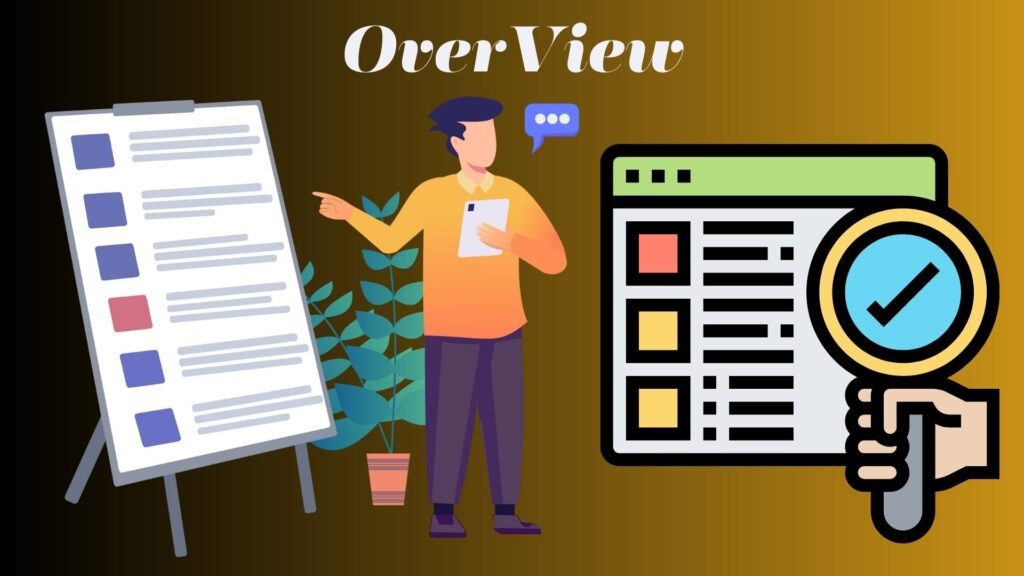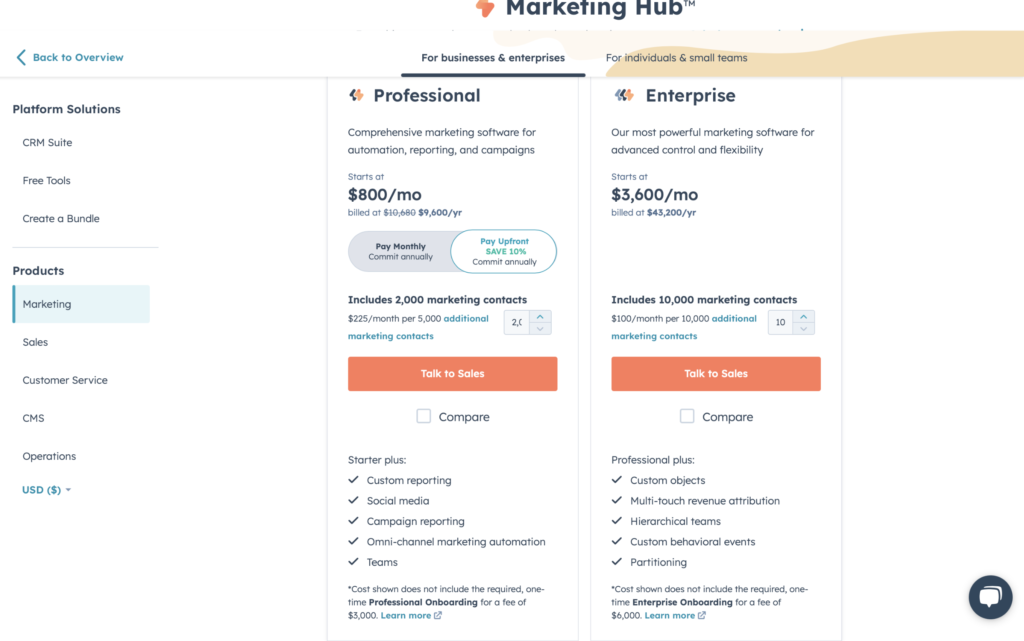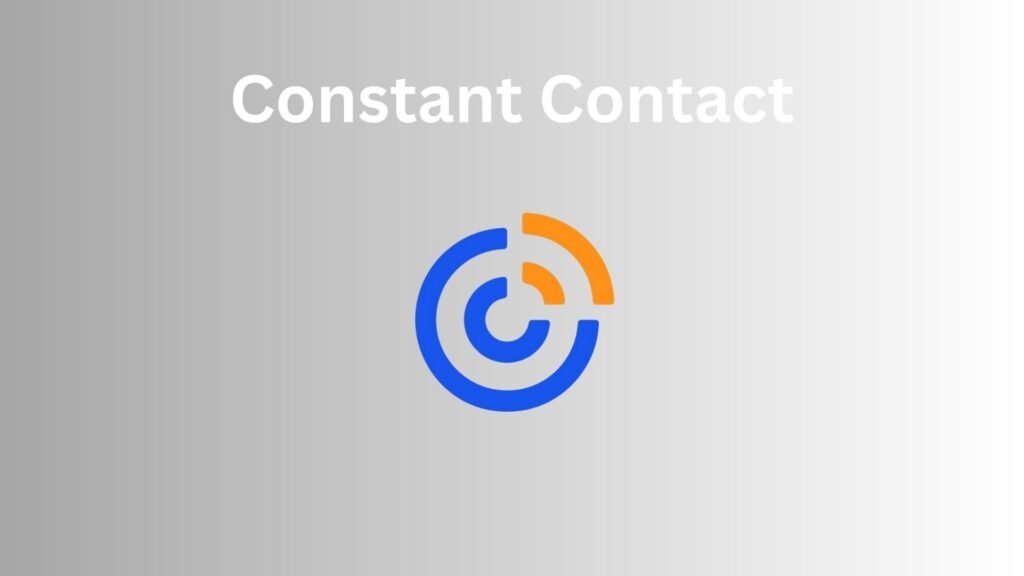In the world of digital marketing, choosing the right email marketing and CRM software can make all the difference for small businesses.
The decision between Constant Contact and HubSpot can be a tough one, as both platforms offer an array of features and capabilities.
In this comprehensive comparison, we’ll delve into the strengths and weaknesses of Constant Contact and HubSpot, helping you decide which software best suits your business needs.
A. Brief overview of email marketing and CRM software
Email marketing software allows businesses to create, send, and track the success of email campaigns, while CRM software helps manage customer interactions and relationships. Combining these tools can lead to a powerful, integrated marketing strategy.
With this in mind, it’s crucial to compare Constant Contact and HubSpot, two leading platforms in the industry.
B. Importance of choosing the right software for small businesses
For small businesses, investing in the right marketing platform can streamline processes, improve open rates and click rates, and ultimately boost revenue.
Choosing between these two Constant Contact vs HubSpot may seem daunting, but by comparing their features, pricing, and overall performance, you’ll be better equipped to make an informed decision.
C. Introduction to Constant Contact vs HubSpot
Constant Contact vs HubSpot, these two are two widely used marketing platforms that cater to small businesses. Constant Contact offers a range of email marketing tools, while HubSpot is an all-in-one CRM, marketing, sales, and customer service platform.
In the following sections, we’ll dive deeper into the specifics of each platform.
Constant Contact vs HubSpot: Overview

Constant Contact vs HubSpot highlights a comparison between two leading marketing automation platforms designed for business growth and customer engagement.
Constant Contact, in the Constant Contact vs HubSpot debate, is renowned for its email marketing prowess, user-friendly interface, and diverse template selection.
HubSpot, by contrast, offers a comprehensive solution with tools for inbound marketing, CRM, and analytics, ensuring an integrated customer experience throughout the sales funnel.
Overview of Constant Contact

Constant Contact is a popular email marketing software designed specifically for small businesses. With user-friendly features and a range of pricing options, it’s a viable choice for businesses looking to streamline their email marketing campaigns.
A. Company Background
Founded in 1995, Constant Contact has been a pioneer in the email marketing space for over two decades. The company has evolved to offer additional marketing tools, catering to the ever-changing needs of small businesses.
B. Key features
1. Email marketing
Constant Contact is known for its robust email marketing features, including customizable templates, A/B testing, and detailed reporting. It offers an easy-to-use interface for creating, sending, and tracking email campaigns.
HubSpot also offers email marketing tools, allowing users to create personalized emails, automate email campaigns, and track performance.
- Drag and drop editor for easy email creation
- Mobile-responsive templates
- Personalization and segmentation features
2. Marketing automation
Both Constant Contact and HubSpot offer marketing automation capabilities, making it easier to send targeted emails based on customer engagement.
Constant Contact provides automation tools for email campaigns, while HubSpot’s automation features extend beyond email to include social media, landing pages, and more.
- Trigger-based email campaigns
- Automated email series
- Autoresponder capabilities
3. Contact management
- Import and manage contacts
- List segmentation and organization
- Customizable sign-up forms
4. E-commerce tools
- Integration with popular e-commerce platforms
- Abandoned cart email reminders
- Order and inventory management
5. Analytics and reporting
In terms of analytics, both Constant Contact and HubSpot offer comprehensive reporting features. Constant Contact provides a top feature of tracking your campaigns, while HubSpot offers customizable reporting dashboards and advanced analytics tools.
- Track open rates and click rates
- View overall campaign performance
- Access detailed subscriber insights
6. Constant Contact vs HubSpot: Integrations
Constant Contact offers integrations with various popular platforms like Salesforce, Shopify, and Etsy, making it easy for businesses to connect their marketing and sales data.
HubSpot also boasts a wide range of integrations, including CRM, sales, and customer service tools.
The ability to connect with various platforms makes both Constant Contact and HubSpot versatile solutions for businesses of all sizes.
Overview of HubSpot

HubSpot is a robust all-in-one marketing platform that combines CRM, sales, customer service, and content management capabilities. With a powerful suite of tools, HubSpot caters to businesses looking to scale their marketing efforts.
A. Company Background
Founded in 2006, HubSpot is a pioneer in inbound marketing, focusing on attracting customers through valuable content and experiences. The company has grown to become a leading provider of marketing software for businesses of all sizes.
B. Key features
1. CRM
- Comprehensive contact management
- Lead scoring and nurturing
- Integration with popular third-party apps
2. Marketing automation
- Advanced workflow creation
- A/B testing capabilities
- Drip campaigns and lead nurturing
3. Sales and customer service tools
- Sales pipeline management
- Deal tracking and automation
- Ticketing and help desk features
4. Content management system (CMS)
- Drag and drop website builder
- Blogging and SEO tools
- Landing page creation
5. Analytics and reporting
- In-depth performance metrics
- Custom reporting and data visualization
- Attribution reporting
Constant Contact vs HubSpot: Pricing

Pricing is an essential factor to consider when comparing Constant Contact vs HubSpot.
HubSpot offers a range of pricing options, including a free plan for basic CRM, sales, and marketing tools.
As businesses grow, they can upgrade to the Marketing Hub, Sales Hub, and Service Hub plans for access to more advanced features.
Constant Contact Pricing

Constant Contact offers a free plan with limited features, and its paid plans start at $9/month for the Email plan.
Core
Constant Contact offers a free trial and two main pricing plans: Email and Email Plus.
The Email plan provides basic email marketing tools.
Best for people getting started with marketing to their customer base.
- Starting at $9.99/month
Price based on the number of contacts - Choose plan
View tiered pricing (Fee Schedule):*
| Contacts | Core |
|---|---|
| 0-500 | $9.99/mo. |
| 501-2,500 | $35/mo. |
| 2,501-5,000 | $55/mo. |
| 5,001-10,000 | $80/mo. |
| 10,001-15,000 | $105/mo. |
| 15,001-20,000 | $130/mo. |
| 20,001-25,000 | $155/mo. |
| 25,001-30,000 | $180/mo. |
| 30,001-35,000 | $210/mo. |
| 35,001-40,000 | $240/mo. |
| 40,001-45,000 | $270/mo. |
| 45,001-50,000 | $300/mo. |
| 50,000+ | List size over 50,000? |
*Packages have a monthly send limit of 24 times your total contacts and an overage fee of $0.002 per email. List sizes over 50,000 contacts are automatically upgraded to our Plus plan.
Core Includes:
- Hundreds of email templates
- Sign-up forms to grow your list
- Post to Facebook, Instagram, and Twitter all at once
- Integrations with popular tools like Shopify, WooCommerce, Canva, and Etsy
- Engagement reporting (i.e., views, clicks, etc.)
- Award-winning live chat and phone support
Recommended: Plus
While the Email Plus plan offers advanced features like event management, surveys, and polls.
Best for marketers who need enhanced features to fuel more growth.
- Starting at $45/month
Price based on the number of contacts - Choose plan
View tiered pricing (Fee Schedule):*
| Contacts | Plus |
|---|---|
| 0-500 | $45/mo. |
| 501-2,500 | $70/mo. |
| 2,501-5,000 | $95/mo. |
| 5,001-10,000 | $125/mo. |
| 10,001-15,000 | $180/mo. |
| 15,001-20,000 | $225/mo. |
| 20,001-25,000 | $270/mo. |
| 25,001-30,000 | $310/mo. |
| 30,001-35,000 | $350/mo. |
| 35,001-40,000 | $370/mo. |
| 40,001-45,000 | $390/mo. |
| 45,001-50,000 | $410/mo. |
| 50,000+ | List size over 50,000? |
Plus Includes (Everything in Core, plus):
- List-growth tools including Google ads
- Dynamic content personalization
- Automated communications (e.g., resend to non-openers)
- In-depth reporting including conversion and sales
- Drag and drop products from your online store
- Auto-generated customer segments for targeting
- Personalized consultation to maximize your capabilities
If you are interested in exploring more about Constant Contact and its features, you can take advantage of their Free Trial. This trial allows you to test their platform and its capabilities, helping you make an informed decision on whether it’s the right fit for your business.
Keep in mind that both the Core and Plus plans have a monthly send limit of 24 times your total contacts, and there’s an overage fee of $0.002 per email for exceeding this limit. If your list size goes beyond 50,000 contacts, you will be automatically upgraded to the Plus plan.
HubSpot Pricing

Professional
Comprehensive marketing software for automation, reporting, and campaigns
- Starts at $800/mo
- billed at $10,680 $9,600/yr
- Pay Monthly
- Commit annually
- Pay Upfront (SAVE 10%)
- Commit annually
Includes 2,000 marketing contacts
$225/month per 5,000 additional marketing contacts
Marketing Contacts Billed At:
| Marketing Contacts | Billed At |
|---|---|
| First 2,000 | $0 |
| 2,001 to 22,000 | $224.72/mo per 5,000 |
| 22,001 to 42,000 | $202.25/mo per 5,000 |
| 42,001 to 62,000 | $179.78/mo per 5,000 |
| 62,001 to 82,000 | $157.30/mo per 5,000 |
| 82,001+ | $134.83/mo per 5,000 |
Email Sends Renews:
20,000 (10x your # of marketing contacts)
Monthly
Compare Marketing Hub Professional
Starter plus:
- Teams
- Social media
- Campaign reporting
- Omni-channel marketing automation
- Custom reporting
*Cost shown does not include the required, one-time Professional Onboarding for a fee of $3,000.
Enterprise
Our most powerful marketing software for advanced control and flexibility
Starts at $3,600/mo
billed at $43,200/yr
Includes 10,000 marketing contacts
$100/month per 10,000 additional marketing contacts
Marketing Contacts Billed At:
| Marketing Contacts | Billed At |
|---|---|
| First 10,000 | $0 |
| 10,001 to 50,000 | $100/mo per 10,000 |
| 50,001 to 100,000 | $90/mo per 10,000 |
| 100,001 to 200,000 | $80/mo per 10,000 |
| 200,001 to 500,000 | $70/mo per 10,000 |
| 500,001+ | $60/mo per 10,000 |
Email Sends Renews:
200,000 (20x your # of marketing contacts)
Monthly
Compare Marketing Hub Enterprise
Professional plus:
- Partitioning
- Multi-touch revenue attribution
- Hierarchical teams
- Custom behavioral events
- Custom objects
*Cost shown does not include the required, one-time Enterprise Onboarding for a fee of $6,000.
Comparing Constant Contact vs HubSpot: Key Features

In this section, we will delve into the details of Constant Contact vs HubSpot, comparing their features, benefits, and drawbacks.
We will consider aspects such as email marketing, automation, integrations, analytics, and more.
When comparing Constant Contact and HubSpot, it’s essential to consider each platform’s strengths and weaknesses in terms of key features.
A. Email marketing: Constant Contact vs HubSpot
Constant Contact is known for its robust email marketing features, including customizable templates, A/B testing, and detailed reporting.
It offers an easy-to-use interface for creating, sending, and tracking email campaigns.
HubSpot also offers email marketing tools, allowing users to create personalized emails, automate email campaigns, and track performance.
1. Templates and design
Both Constant Contact and HubSpot offer drag-and-drop editors and a variety of mobile-responsive templates. While Constant Contact has a reputation for being more user-friendly, HubSpot provides greater customization options for businesses looking to create unique emails.
2. Deliverability rates
Deliverability is crucial for successful email marketing campaigns. Constant Contact and HubSpot both prioritize high deliverability rates and provide tools to optimize email content for improved open rates and click rates.
3. Personalization and segmentation
Both platforms offer advanced personalization and segmentation features, allowing businesses to target specific audience segments with tailored content. HubSpot’s CRM integration gives it an edge in terms of data enrichment and targeting capabilities.
B. Marketing automation: Constant Contact vs HubSpot
Both Constant Contact and HubSpot offer marketing automation capabilities, making it easier to send targeted emails based on customer engagement.
Constant Contact provides automation tools for email campaigns, while HubSpot’s automation features extend beyond email to include social media, landing pages, and more.
1. Workflow creation
While both Constant Contact and HubSpot offer marketing automation tools, HubSpot’s advanced workflow creation capabilities cater to businesses looking for more complex automation solutions.
2. Trigger-based campaigns
Both platforms support trigger-based campaigns, allowing businesses to send automated email sequences based on subscriber behavior. However, HubSpot’s CRM integration and advanced analytics make it easier to create highly targeted, data-driven campaigns.
3. A/B testing
A/B testing is crucial for optimizing email marketing campaigns. While Constant Contact offers basic A/B testing capabilities, HubSpot provides more advanced testing options, including multivariate testing and detailed performance analysis.
C. Contact management: Constant Contact vs HubSpot
Constant Contact offers integrations with various popular platforms like Salesforce, Shopify, and Etsy, making it easy for businesses to connect their marketing and sales data. HubSpot also boasts a wide range of integrations, including CRM, sales, and customer service tools. The ability to connect with various platforms makes both Constant Contact and HubSpot versatile solutions for businesses of all sizes.
1. Integrations and APIs
Both Constant Contact and HubSpot offer numerous integrations with third-party apps, making it easy to streamline contact management. HubSpot, however, offers a more comprehensive API, allowing for greater customization and flexibility.
2. Lead scoring and nurturing
While both platforms offer lead scoring and nurturing capabilities, HubSpot’s CRM integration provides more in-depth insights and advanced lead management tools.
3. Data enrichment
HubSpot excels in data enrichment, offering tools to gather detailed information about contacts and leads. Constant Contact provides basic contact management features but lacks the robust data enrichment capabilities found in HubSpot.
D. Analytics and reporting: Constant Contact vs HubSpot
In terms of analytics, both Constant Contact and HubSpot offer comprehensive reporting features.
Constant Contact provides a top feature of tracking your campaigns, while HubSpot offers customizable reporting dashboards and advanced analytics tools.
1. Performance metrics
Constant Contact and HubSpot both offer detailed performance metrics for email marketing campaigns, including open rates, click rates, and conversion data. HubSpot, however, provides more in-depth insights into customer behavior and campaign performance.
2. Custom reports
While both platforms offer custom reporting options, HubSpot’s reporting capabilities are more advanced, allowing businesses to create detailed, data-driven reports that inform marketing strategy.
3. Data visualization
HubSpot’s data visualization tools make it easier to interpret and understand campaign performance, while Constant Contact offers more basic visualization options.
Constant Contact Features

Constant Contact is an email marketing platform that offers a wide range of features designed to help businesses create, send, and track email campaigns.
The platform is divided into three main categories: Create & Edit, Grow & Track, and Social & Mobile. Here’s a brief overview of the features available in each category:
Create & Edit
- Email Marketing
- Email Templates
- Marketing Automation
- Landing Pages
- Event Marketing
Grow & Track
- List-Building Tools
- A/B Testing
- Integrations
- Reporting
- CRM
- E-commerce
Social & Mobile
- SMS Marketing
- Social Media Marketing
- Mobile Apps
HubSpot Features

HubSpot is an all-in-one marketing, sales, and customer service platform that offers a variety of features to help businesses grow.
HubSpot’s Marketing Hub is available in two pricing tiers: Professional and Enterprise.
Here’s a brief overview of the features available in each tier:
Marketing Hub Professional
- Calculated properties
- Campaign management
- Filtered analytics view
- Social media
- Multi-language content
- Marketing events object
- Content strategy
- List segmentation
- Standard contact scoring
- Mobile optimization
- SEO recommendations & optimizations
- Blog
Marketing Hub Enterprise
- Partitioning
- Multi-touch revenue attribution
- Hierarchical teams
- Custom behavioral events
- Custom objects
As you can see, both Constant Contact and HubSpot offer a wealth of features designed to help businesses succeed in their marketing efforts.
The choice between Constant Contact vs HubSpot will ultimately depend on your specific needs and budget.
Constant Contact vs HubSpot: Pros and Cons

When considering Constant Contact vs HubSpot, it’s important to weigh the pros and cons of each platform to determine which is the best fit for your business.
Here, we will discuss the pros and cons of Constant Contact vs HubSpot to help you make an informed decision.
A. Constant Contact

1. Pros
- User-friendly: Known for its intuitive interface, Constant Contact makes it easy for users to create and manage email marketing campaigns.
- Affordable pricing: With a range of pricing options, including a free trial, Constant Contact is an accessible choice for small businesses on a budget.
- E-commerce integration: For businesses with an e-commerce focus, Constant Contact offers valuable tools and integrations that streamline online sales.
- Easy-to-use interface for creating, sending, and tracking email campaigns.
- Wide range of customizable email templates.
- Comprehensive reporting and analytics tools.
- Variety of integrations with popular platforms.
2. Cons
- Limited advanced marketing features: While Constant Contact is excellent for basic email marketing, it lacks some of the more advanced marketing automation and CRM features found in HubSpot.
- Less comprehensive CRM: Constant Contact’s CRM capabilities are limited compared to HubSpot’s robust contact management tools.
- Limited customization: Though user-friendly, Constant Contact’s customization options are not as extensive as those offered by HubSpot.
- Limited marketing automation features compared to HubSpot.
- No built-in CRM, although integrations are available.
B. HubSpot

1. Pros
- All-in-one platform: As a comprehensive marketing platform, HubSpot combines CRM, sales, customer service, and content management capabilities, offering a holistic solution for growing businesses.
- Robust CRM: HubSpot’s CRM is more advanced than Constant Contact’s, providing better lead management, data enrichment, and targeting capabilities.
- Advanced marketing automation: HubSpot’s marketing automation features cater to businesses looking for more complex and data-driven campaigns.
- Comprehensive marketing, sales, and customer service tools.
- Advanced marketing automation capabilities.
- Customizable reporting and analytics features.
- Wide range of integrations with popular platforms.
2. Cons
- Higher price point: HubSpot’s pricing can be more expensive than Constant Contact’s, particularly for businesses looking to access advanced features.
- Steeper learning curve: While HubSpot is a powerful platform, it may take more time and effort for users to master its tools and features.
- Potentially overwhelming for small businesses: Due to its extensive feature set, HubSpot may be overwhelming for small businesses that only require basic email marketing tools.
- More expensive than Constant Contact, particularly for small businesses.
- The learning curve may be steeper for users new to marketing automation and CRM.
Constant Contact vs HubSpot: Ease of Use

When it comes to ease of use, both Constant Contact and HubSpot are user-friendly platforms designed to cater to different levels of expertise.
Constant Contact is known for its simplicity and ease of use, especially for those new to email marketing.
HubSpot, while offering more advanced features, maintains a user-friendly interface with a wealth of resources to help users navigate the platform.
Use Cases and Recommendations
When deciding between Constant Contact and HubSpot, consider the following recommendations based on specific business needs:
- Best for small businesses with limited resources: Constant Contact, with its affordable pricing and user-friendly interface, is a great choice for small businesses looking to launch email marketing campaigns without a hefty investment.
- Best for e-commerce businesses: Constant Contact’s e-commerce integration and tools make it a suitable choice for businesses focused on online sales.
- Best for businesses looking for an all-in-one solution: HubSpot, with its comprehensive suite of tools and robust CRM, caters to businesses that want to consolidate their marketing, sales, and customer service efforts.
- Best for businesses with a focus on growth and scalability: HubSpot’s advanced marketing automation and data-driven features make it an ideal choice for businesses looking to scale their marketing efforts and grow their customer base.
Check out our other Blogs
Constant Contact vs Convert kit
Constant Contact vs Hubspot:- Conclusion

Choosing between Constant Contact and HubSpot ultimately depends on your business’s specific needs and goals.
While Constant Contact offers a user-friendly, affordable solution for basic email marketing, HubSpot provides a more comprehensive platform with advanced automation and CRM capabilities.
By weighing the pros and cons of each platform, as well as considering your unique business requirements, you’ll be better equipped to make an informed decision that will set your small business up for success in the digital marketing world.
Constant Contact vs HubSpot: Recap and Final Thoughts
Here is a summary of the key differences between Constant Contact and HubSpot:
- Focus: Constant Contact is primarily an email marketing software, while HubSpot is an all-in-one marketing, CRM, sales, and customer service platform.
- Ease of use: Constant Contact is known for its user-friendly interface, while HubSpot may have a steeper learning curve due to its extensive features.
- Pricing: Constant Contact offers more affordable pricing options, including a free trial, whereas HubSpot’s advanced features come at a higher price point.
- Marketing automation: While both platforms offer marketing automation tools, HubSpot provides more advanced capabilities, such as complex workflow creation and data-driven campaigns.
- CRM: HubSpot’s CRM is more comprehensive and powerful compared to Constant Contact’s basic contact management features.
- E-commerce tools: Constant Contact caters to e-commerce businesses with its integrations and tools for online sales, while HubSpot focuses on a broader range of marketing efforts.
- Customization: HubSpot offers greater customization options for email templates and marketing campaigns, while Constant Contact is more limited in this regard.
B. Final thoughts on choosing the right platform for your business
Before making your decision, take the time to evaluate your business’s current and future requirements, as well as your budget and technical capabilities.
By considering these factors and weighing the pros and cons of each platform, you’ll be able to select the best solution for your small business, driving growth and success in the digital marketing landscape.
Frequently Asked Questions
Q: Does HubSpot work with Constant Contact?
Yes, HubSpot can be integrated with Constant Contact through third-party connectors or custom API integrations. This allows you to combine the email marketing capabilities of Constant Contact with HubSpot’s CRM, marketing, and sales tools for a more comprehensive marketing strategy.
Q: Which CRM is better than HubSpot?
The answer depends on your specific business needs and goals. Some popular alternatives to HubSpot include Salesforce, Microsoft Dynamics, Zoho CRM, and Pipedrive. Each CRM platform offers its own set of features, pricing, and integrations, so it’s essential to research and compare options before deciding on the best CRM for your business.
Q: Can Constant Contact be used as a CRM?
Constant Contact offers basic contact management features that can function as a simple CRM for small businesses. However, it lacks the advanced CRM capabilities, data enrichment, and extensive integrations found in more robust CRM platforms like HubSpot or Salesforce.
Who should use Constant Contact?
Constant Contact is best suited for small businesses, nonprofits, and organizations that need a user-friendly and affordable email marketing solution. If your primary focus is on sending newsletters, promotional emails, or running basic email marketing campaigns, Constant Contact can be an excellent choice.
How much does a HubSpot subscription cost?
A HubSpot subscription cost varies based on the specific package and features required. HubSpot offers a free CRM with limited features, while their paid plans include Marketing Hub, Sales Hub, Service Hub, and CMS Hub, each available in Starter, Professional, and Enterprise tiers. Prices range from $45/month for a Starter plan to $3,200+/month for Enterprise plans. The cost ultimately depends on your business’s needs and goals, so it’s essential to compare plans and features before making a decision.
